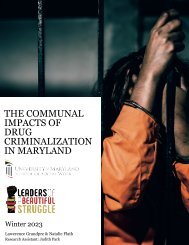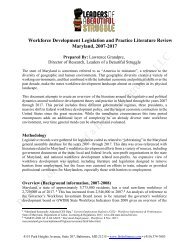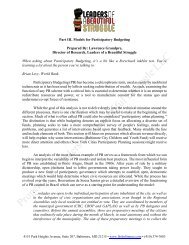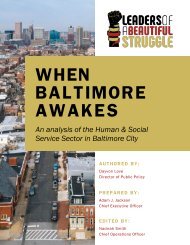Drug Decriminalization in Maryland Through an African Centered Research Paradigm- Analysis and Recommendations
This document offers guidance for theorizing questions related to a proposed research project purposed to advance drug decriminalization in Maryland.
This document offers guidance for theorizing questions related to a proposed research project purposed to advance drug decriminalization in Maryland.
- No tags were found...
You also want an ePaper? Increase the reach of your titles
YUMPU automatically turns print PDFs into web optimized ePapers that Google loves.
households, this is a research tactic which deserves scrut<strong>in</strong>y. Politici<strong>an</strong>s <strong>an</strong>d theories such as D<strong>an</strong>iel<br />
Patrick Moynah<strong>an</strong> used <strong>an</strong> <strong>an</strong>alysis of female headed households as a sign of social economic<br />
disadv<strong>an</strong>tage to recommended <strong>an</strong> assimilationist politics seek<strong>in</strong>g <strong>in</strong>culcate socially appropriate<br />
patriarchal values <strong>in</strong>to the Black community, <strong>in</strong>clud<strong>in</strong>g recommend<strong>in</strong>g more Black men be sent to<br />
war as a tool to combat this d<strong>an</strong>gerous amtriacrhical excess (Moynih<strong>an</strong>, 1965). This <strong>an</strong>alysis was<br />
roundly criticized as not only reflect<strong>in</strong>g <strong>an</strong>ti-black bias, but also fundamentally misunderst<strong>an</strong>d<strong>in</strong>g<br />
the family structures of people fo Afric<strong>an</strong> descent, which typically do not fit a simple, nuclear<br />
framework. Rather th<strong>an</strong> see<strong>in</strong>g the possibilities with<strong>in</strong> the extended, non-nuclear family structures<br />
with<strong>in</strong> Black communities, Moynahi<strong>an</strong> sees them as different <strong>an</strong>d therefore deficient, <strong>an</strong>d while<br />
these researchers don’t seem to share Moynah<strong>an</strong>’s views, they use similar research methodologies<br />
by embrac<strong>in</strong>g the notion of “female led households” as a salient measure of social -economic<br />
distress. While this is clearly not the <strong>in</strong>tent of the researchers, one wonders if they felt <strong>an</strong><br />
appropriate sense of urgency of f<strong>in</strong>ish<strong>in</strong>g <strong>an</strong> alternative metric of socio- economic disadv<strong>an</strong>tage <strong>in</strong><br />
order to not risk replicat<strong>in</strong>g the pernicious myth of there be<strong>in</strong>g someth<strong>in</strong>g <strong>in</strong>herently wrong with a<br />
frame headed household. That the researchers made this choice with<strong>in</strong> the context of research<br />
related to the War on <strong>Drug</strong>s makes the choice particularly ironic, as it is the hyper <strong>in</strong>carceration of<br />
men, specifically Black men, which created the context for the predom<strong>in</strong><strong>an</strong>ce of female lead<br />
households <strong>in</strong> the Black community (Clear, 2010b). This historical context, as well as a potential<br />
alternative historical metric for evaluat<strong>in</strong>g the data (historical arrest rates) is ignored, <strong>an</strong>d the<br />
researchers isolated female headed households as if it was some neutral lens through which to<br />
evaluate historical socio -economic disadv<strong>an</strong>tage.<br />
<strong>Research</strong>ers around drug decrim<strong>in</strong>alization have also commonly makes argumentative<br />
choices which risk limit<strong>in</strong>g the scope of political <strong>an</strong>alysis. The Hum<strong>an</strong> Rights Watch reports makes<br />
one of these choices when it chooses to focus a large chunk of its <strong>an</strong>alysis on the <strong>in</strong>nocence of the<br />
<strong>in</strong>dividuals swept up <strong>in</strong> the War on <strong>Drug</strong>s dragnets, writ<strong>in</strong>g:<br />
“Numerous <strong>in</strong>terviewees <strong>in</strong> each state we visited said they had pled guilty even though they<br />
were <strong>in</strong>nocent. M<strong>an</strong>y said they did not feel they had <strong>an</strong>y other real choice. Defend<strong>an</strong>ts,<br />
defense attorneys, judges, <strong>an</strong>d prosecutors <strong>in</strong> different jurisdictions used the l<strong>an</strong>guage of<br />
gambl<strong>in</strong>g: would the defend<strong>an</strong>t “roll the dice” <strong>an</strong>d go to trial? Most defend<strong>an</strong>ts said no,<br />
because the odds were aga<strong>in</strong>st them <strong>an</strong>d the stakes were too high.<br />
In Texas, where defense attorneys said laboratory sc<strong>an</strong>dals <strong>an</strong>d faulty roadside drug tests<br />
had raised concerns, Harris County beg<strong>an</strong> test<strong>in</strong>g drugs <strong>in</strong> possession cases that had<br />
already been closed. S<strong>in</strong>ce 2010, there have been at least 73 exonerations <strong>in</strong> Harris County<br />
for drug possession or sale where the defend<strong>an</strong>t pled guilty for someth<strong>in</strong>g that turned out<br />
not to be a crime at all. In 2015 alone, there were 42.279<br />
Of the 42 exonerees <strong>in</strong> 2015, only six were white.280 Most or all had been adjudged<br />
<strong>in</strong>digent, me<strong>an</strong><strong>in</strong>g they could not afford <strong>an</strong> attorney <strong>an</strong>d had either a public defender or<br />
<strong>an</strong>other attorney appo<strong>in</strong>ted for them. One of those attorneys, Natalie Schultz, said a<br />
4151 Park Heights Avenue, Suite 207, Baltimore, MD 21215 • www.lbsbaltimore.com • (410) 374-7683









